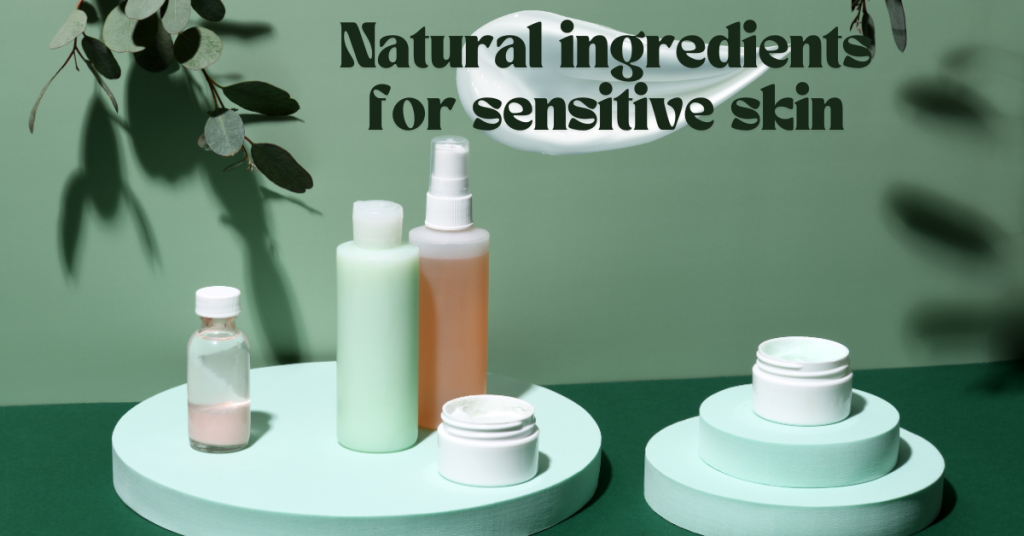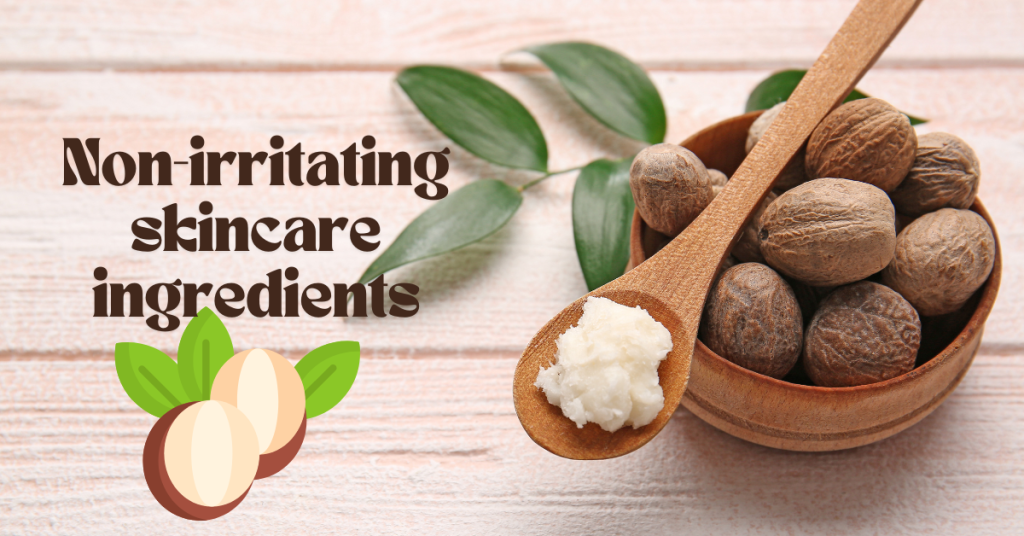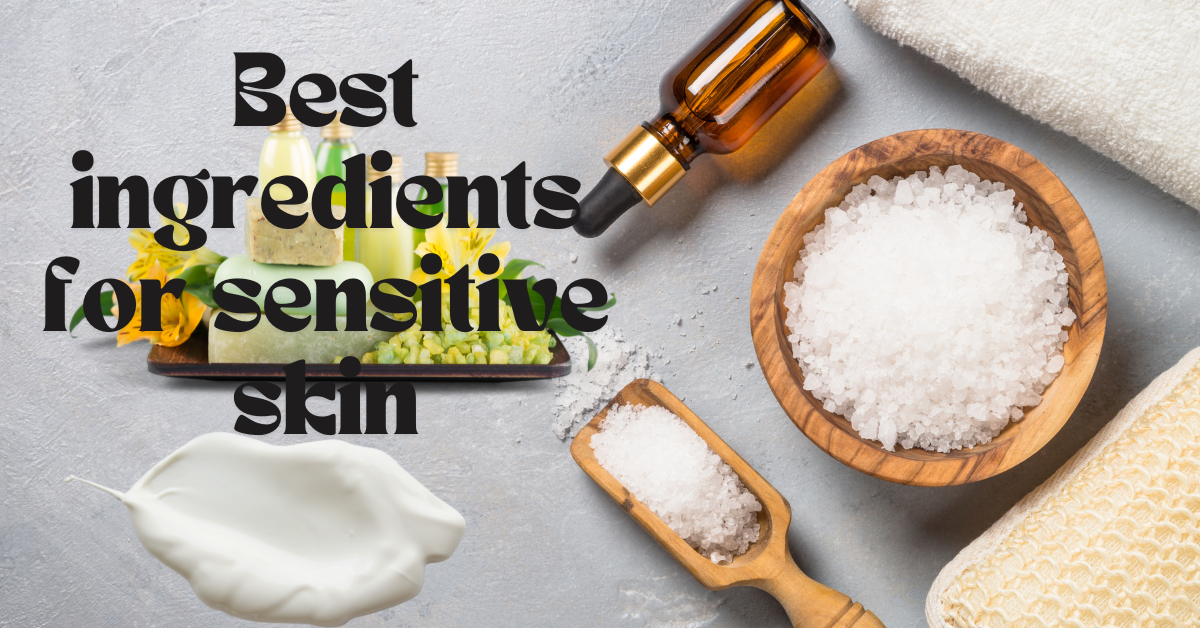Essential Ingredients for Sensitive Skin Care: A Comprehensive Guide
Sensitive skin can be challenging to manage, as it reacts more easily to various environmental factors, products, and irritants. If you have sensitive skin, you likely experience redness, itchiness, dryness, and even breakouts when exposed to certain ingredients or skincare routines. The key to managing sensitive skin lies in understanding which ingredients soothe, protect, and hydrate, without causing further irritation.
This article will explore the essential ingredients for sensitive skin care, ensuring you can build a skincare routine that nourishes your skin and keeps it calm and balanced.
1. Aloe Vera: Nature’s Soothing Wonder
Aloe vera has been used for centuries to treat burns, wounds, and irritated skin, making it one of the most effective ingredients for sensitive skin. Its soothing properties help reduce inflammation and redness, while also providing moisture to dry or flaky areas.
- Benefits for Sensitive Skin: Aloe vera contains antioxidants, enzymes, and vitamins A and C, making it ideal for calming irritation and hydrating without being heavy. Its cooling effect also offers relief from skin reactions.
- How to Use: Look for moisturizers or gels with a high concentration of pure aloe vera. You can also use aloe vera directly from the plant for a more natural approach.
2. Colloidal Oatmeal: A Barrier-Building Champion
Colloidal oatmeal is finely ground oatmeal that has been used in skincare for its anti-inflammatory properties. It forms a protective barrier over the skin, locking in moisture and protecting sensitive skin from external irritants.
- Benefits for Sensitive Skin: Colloidal oatmeal is particularly effective for those dealing with eczema or dermatitis. It helps soothe itching, irritation, and provides relief from redness while strengthening the skin’s natural barrier.
- How to Use: Find products like moisturizers, body washes, or lotions that contain colloidal oatmeal. You can also create DIY oatmeal masks for a gentle, nourishing treatment at home.
3. Niacinamide: The Balancing Hero

Niacinamide, also known as vitamin B3, is a versatile ingredient that offers multiple benefits for sensitive skin. It works to reduce inflammation, improve the skin barrier, and control excess oil, all while providing hydration.
- Benefits for Sensitive Skin: Niacinamide is particularly beneficial for sensitive skin because it helps reduce redness and irritation while keeping the skin hydrated. It can also reduce blotchiness and fine lines, making it a good choice for aging-sensitive skin.
- How to Use: Niacinamide is commonly found in serums, moisturizers, and toners. Start with a lower concentration and gradually build up to avoid irritation.
4. Ceramides: The Skin Barrier Builders
Ceramides are naturally occurring lipids (fats) found in the skin that help maintain its moisture balance and protect against environmental stressors. Sensitive skin often has a compromised barrier, making ceramides essential in repairing and strengthening the skin.
- Benefits for Sensitive Skin: Ceramides help restore the skin’s natural barrier, preventing water loss and shielding the skin from external irritants. They are particularly useful for dry, flaky, or irritated sensitive skin.
- How to Use: Look for ceramide-rich moisturizers and creams. They are often combined with other hydrating ingredients like glycerin or hyaluronic acid to enhance their effectiveness.
5. Hyaluronic Acid: The Hydration Powerhouse
Hyaluronic acid is a hydrating ingredient that naturally occurs in the skin. It can hold up to 1,000 times its weight in water, making it an essential component of any skincare routine, especially for sensitive skin that is prone to dryness.
- Benefits for Sensitive Skin: Hyaluronic acid hydrates without clogging pores or causing irritation, which makes it ideal for sensitive skin. It helps keep the skin plump and reduces the appearance of fine lines.
- How to Use: You’ll find hyaluronic acid in serums, moisturizers, and even sheet masks. Apply it after cleansing and before moisturizing to lock in hydration.
6. Chamomile: Calming and Anti-Inflammatory
Chamomile is a plant extract well known for its soothing and calming properties. Its anti-inflammatory and antioxidant-rich compounds help reduce redness and irritation, making it ideal for sensitive skin.
- Benefits for Sensitive Skin: Chamomile helps soothe irritation caused by environmental factors, reduces redness, and calms allergic reactions. Its natural healing properties make it a great ingredient for people with reactive skin.
- How to Use: Chamomile is often found in toners, cleansers, and moisturizers. You can also use chamomile tea as a DIY toner by steeping it and letting it cool before applying it to your face.
7. Shea Butter: Nourishing and Protective

Shea butter is a deeply nourishing ingredient derived from the nuts of the shea tree. It is rich in vitamins A and E, making it ideal for moisturizing and protecting sensitive skin without causing irritation.
- Benefits for Sensitive Skin: Shea butter’s emollient properties make it excellent for softening and hydrating dry, sensitive skin. It also contains anti-inflammatory compounds that can help soothe irritation and calm redness.
- How to Use: Use shea butter in creams, lotions, or balms, especially during colder months when sensitive skin tends to become drier. It works well in thick moisturizers for intense hydration.
8. Squalane: Lightweight and Hydrating
Squalane is a lightweight, non-comedogenic oil that mimics the skin’s natural oils, making it an excellent ingredient for sensitive skin. It provides hydration without leaving the skin greasy or clogged.
- Benefits for Sensitive Skin: Squalane is known for its ability to moisturize, soothe, and reduce inflammation. It is especially helpful for skin that is both dry and sensitive, as it offers hydration without irritation.
- How to Use: Squalane can be found in face oils, serums, and moisturizers. It’s safe for use on all skin types and is particularly beneficial for sensitive skin due to its gentle nature.
9. Licorice Extract: A Natural Anti-Inflammatory
Licorice extract is a natural ingredient that has anti-inflammatory and skin-brightening properties. It is especially useful for sensitive skin that is prone to redness or hyperpigmentation.
- Benefits for Sensitive Skin: Licorice extract helps calm irritation and reduces redness while brightening dark spots caused by acne or sun damage. It’s an excellent choice for those with reactive or rosacea-prone skin.
- How to Use: Licorice extract is commonly found in serums, creams, and toners designed for sensitive or inflamed skin.
10. Glycerin: A Skin Hydration Staple
Glycerin is a humectant, meaning it draws moisture from the air into the skin. It is widely used in skincare products because of its ability to hydrate and protect sensitive skin without causing irritation.
- Benefits for Sensitive Skin: Glycerin helps to maintain moisture levels, making the skin feel soft and supple. It is gentle enough for even the most reactive skin and helps protect the skin’s natural barrier.
- How to Use: Look for glycerin in cleansers, moisturizers, and serums. It pairs well with other hydrating ingredients like hyaluronic acid to provide maximum hydration.
11. Green Tea Extract: Antioxidant Powerhouse
Green tea extract is packed with antioxidants that help protect sensitive skin from environmental stressors and soothe irritation. Its anti-inflammatory properties make it a must-have for sensitive skin care.
- Benefits for Sensitive Skin: Green tea extract helps calm redness, reduce puffiness, and protect the skin from damage caused by free radicals. It is particularly beneficial for those who experience sensitivity due to sun exposure.
- How to Use: Green tea extract is often found in serums, moisturizers, and eye creams. Look for products that highlight green tea as a primary ingredient for maximum benefits.
Final Thoughts: Choosing the Right Ingredients for Your Sensitive Skin
When building a skincare routine for sensitive skin, it’s important to focus on gentle, soothing, and hydrating ingredients that work to protect and repair the skin’s barrier. Avoid harsh chemicals, fragrances, and abrasive exfoliants that can aggravate your skin.
Start by introducing one or two of these ingredients into your routine, allowing your skin to adjust. Over time, you’ll notice improved hydration, reduced redness, and a calmer complexion that can better handle environmental stressors.
Sensitive skin may require extra care, but with the right ingredients, you can enjoy a healthy, glowing complexion free from irritation.




